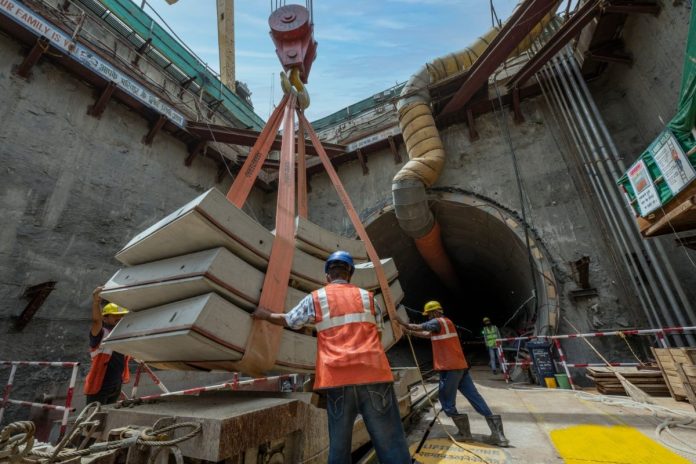With four tunnel boring machines at work, the construction of Anand Vihar RRTS station, one of the largest underground stations on the Delhi-Ghaziabad-Meerut corridor, is progressing rapidly.
Despite challenges, the underground station at Anand Vihar is being constructed in such a way that while Metro train would run on elevated track upstairs, RRTS train would be operational right 8 metre below the surface as per the multi-modal integration plan at Anand Vihar.
According to NCRTC, to ensure maximum convenience to commuters and for their uninterrupted travel, construction of RRTS stations are planned in a way that they are connected to the existing modes of public transport wherever possible and are being built as close as possible to them.
The location of Anand Vihar RRTS station is strategically designed to facilitate multi-modal integration among the six modes of public transport present here.
This includes the Swami Vivekananda (Anand Vihar) Inter-State Bus Stand located at a distance of 150 meters, the City Bus Stand located at a distance of 150 meters, the Bus Stand of Uttar Pradesh State Road Transport Corporation (UPSRTC) located at Kaushambi at a distance of 100 meters.
The two metro corridors, the Pink and Blue Lines at a distance of 50 meters and the Anand Vihar Railway Station located at a distance of 200 meters from the Anand Vihar RRTS Station.
NCRTC Managing Director, Vinay Kumar Singh, said it is a huge logistical effort as there would be escalators, lift for passengers and foot over bridge for pedestrians.
At present, a Foot Over Bridge (FOB) is in place to connect the Metro Complex to Chaudhary Charan Singh Marg. The facility of lift, stairs and escalators will be provided to connect the RRTS station to it.
The base slab and concourse level of Anand Vihar station have been completed and the construction of the platform level is nearing completion. Presently, the construction of the roof of the Concourse level is being carried out. The track laying at the platform level will commence soon.
This station is being constructed by top-down method, which means construction is first done at the ground level and then progresses to the underground level.
Four tunnel boring machines (TBM), also named as Sudarshan, are being engaged in the construction of tunnels for the corridor near the station. Two of these tunnels are being constructed from Anand Vihar towards New Ashok Nagar for 3 km and from Anand Vihar towards Sahibabad for 2 km.
Sudarshan 4.1, the first TBM working in the direction of New Ashok Nagar, has completed the construction of about 1.5 km of tunnel. The second TBM, Sudarshan 4.2, has completed the construction of its parallel tunnel for about 1.2 km.
Along with this, the third TBM, Sudarshan 4.3, towards Sahibabad has completed about 700 meters of tunnel and the fourth TBM, Sudarshan 4.4, has recently commenced tunnelling for the parallel tunnel. These four TBMs have completed a total of about 4 km of tunnel construction in both directions.
A retrieving shaft has been constructed at Khichripur to retrieve both the TBMs tunnelling in the direction of New Ashok Nagar. At the same time, a retrieving shaft has been built in front of Vaishali metro station to retrieve both the TBMs tunnelling towards Sahibabad.

Challenges in the construction of the station
Multi-modal integration being the core principle of the project, RRTS stations are strategically designed and built as close as possible to the existing modes of public transport to connect them.
In order to make it possible, NCRTC team has to deal with many complexities related to construction and civil engineering. Anand Vihar RRTS station is an excellent example of this.
In the preliminary detailed project report, the station was planned to be constructed at about 8 meters below the concourse level and 16 meters below the rail level.
However, in doing so, the existing Metro infrastructure was coming in the way of the construction of the RRTS corridor. Also, due to the greater depth of the station, subways and additional lifts, stairs and escalators had to be built to connect it with other transport modes.
Moreover, despite such provisions, passengers would have had to walk a lot and climb many stairs to get from one means to another. The difficulty would’ve been even more for the elderly, children, handicapped or passengers travelling with heavy luggage from the railway station or ISBT.
Therefore, its design was reconsidered. After re-evaluation, the depth of Anand Vihar RRTS station was reduced to 8 m from the earlier plan of 16 m and the concourse level was shifted to ground level.
Making this change possible in station design was a complex and challenging task. To make the construction of the proposed corridor possible after raising the level of the station, it is being constructed through the basement of the metro lines passing through Anand Vihar.


